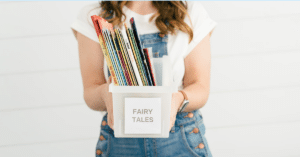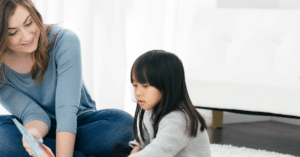Listen on Apple Podcasts Listen on Spotify
Emotional Literacy and Speech-Language Pathologists
There are at least a few things SLPs don’t study in school that would be helpful in practice, and emotional literacy belongs on that list.
In this episode of the SLP Now podcast, Dr. Laura Mansfield and Marisha sat down to talk about emotions, and what they have to do with our wellness as SLPs.
We’ve been doing a special series on the podcast called The Joyful SLP.
So far we’ve talked about self-care and self-reflection — this week we’re going to get in our feels and talk about emotions, because for so many of us, emotional literacy just wasn’t taught.
Whether we learned to “go away” when we had “bad” feelings and return when we felt better, or we were taught to avoid the feelings that make us uncomfortable altogether, very few were given frameworks to help them identify and process their emotions.
But it’s never too late to learn something new!
Like (almost) anything else, you can learn and practice emotional intelligence — and the payoff of learning these skills is huge, especially if you’re working with youth. We teach our students so much more than articulation and narrative structure, and we can’t model those emotional literacy skills unless we have them for ourselves!
“Emotions are a physiological response, and when I am feeling really sad, instead of like, “Oh, no, that’s a bad emotion. I need to get rid of it. We need to stuff it away”… just breathing through it and feeling it and really noticing it and allowing that sadness because it’s there for a reason and it’s teaching me something.” — Marisha Mets
This conversation is a must-listen for any SLP that has feelings… which means all of you!
Resources Mentioned
💛 The Mood app
💛 Dr. Marc Brackett’s book “Permission to Feel”
💛 The SLP Summit
Episode Summary
In the episode, Marisha and Laura talk about:
Their experiences with emotion growing up. Neither Laura nor Marisha were given a framework to help them connect with and understand their emotions when they were younger, and they learned to ignore or suppress their feelings instead.
Emotional differentiation. Laura shares about her experiences as a people-pleaser, and how she was avoiding her own feelings by being preoccupied with the feelings of others. She learned that she was giving to others not because she wanted to, but because she wanted them to like her, and that wasn’t healthy.
Labeling emotions. Marisha shared how she learned to name her emotions (without judgment!) and let them pass without needing to do or change anything — and how much she learns with that practice.
The relationship between self-reflection and your emotions. Marisha and Laura share how they connect with their feelings and the tools they use to support that process
Modeling emotion management for students. As Laura points out, we cannot teach something that we don’t know how to do for ourselves, and emotional/social skills are as important to our students’ development as their ability to articulate their consonants.
“I needed to learn a whole new vocabulary. And there are such beautiful nuanced words for emotions and what a gift as SLPs, because we understand the gradation of language.” — Dr. Laura Mansfield
Excerpts from the Episode
Laura: “I was loved and cared for, but like that part of, you know, my emotional life wasn’t really a big part of growing up that I remember. And I very much grew to be a people pleaser, because I wanted everyone around me to be okay, because I felt like if you were okay, you were okay with me and then I could be okay.
And it took me many years to realize how really self-centered and selfish that was for me. Because even though it felt very giving, like I was always caring for everyone else, it was very self-motivated because it helped me feel better if I knew you were happy with me.”
Laura: “I became really good at reading other people, seeing what they needed and what they wanted, anticipating their needs and providing it.
And then I would feel resentful because I was always giving, giving, giving. And I think because of that, that part of my life of my emotional development was pretty stunted, even as an adult.”
Marisha: “So just as an example, after the SLP Summit… It’s always a very busy week. I love, love, love getting to connect with the presenters and the SLPs, and it’s such a beautiful thing. But I’m also an introvert and so after Laura shared the app, I downloaded it and I was like, “Okay, let’s check in and see how I’m feeling.”
Towards the end of Summit, I was going through the colors and the emotion that came up was drained. I was feeling a little drained. I was kind of tired and I poured out a lot from my bucket. It was really beautiful because it prompted that reflection. Sometimes it’s like, “Oh, I’m not familiar with that emotion. What do I do with it?””
Marisha: “Sometimes we sit with it. Sometimes we don’t need to do anything. We can just let it be and it’ll dissipate, teach us what we need to know and go away. But I love that the app gives you some tactical things that you can do if you feel like you need a bucket filler. So one of the things that it recommended was to watch a funny movie, and I was like, “That is a brilliant idea.” So that’s what I did.”
Subscribe
Listen to The SLP Now Podcast on Apple ★ Spotify ★ Google ★ Stitcher ★ Castbox or wherever you listen to podcasts.
Transcript
03 Emotions
[00:00:00] Laura: Did you ever see the Disney movie Inside Out?
[00:00:01] Marisha: Yes.
[00:00:02] Laura: Did you like it?
[00:00:03] Marisha: I loved it.
[00:00:04] Laura: Yeah. Tell me a little bit about your upbringing with emotions. Was emotional talk a big part of your life?
[00:00:13] Marisha: I don't think so. I don't really remember talking about emotions very much. I remember when I was in fifth grade, I had a lot of emotions around friendships.
[00:00:25] Laura: Yes.
[00:00:25] Marisha: And my parents were very supportive. I remember crying about something that happened and they were there for me, but I don't think we labeled the emotions or had much kind of conversation around that specifically.
[00:00:44] Laura: Yeah. I think for me growing up, it always kind of felt like if you weren't okay, if you didn't feel okay or in a good space, you would just remove yourself.
[00:00:54] Marisha: Mm-hmm.
[00:00:54] Laura: And when you were okay, then you could come back.
[00:00:56] Marisha: Mm-hmm.
[00:00:57] Laura: But I also don't have memories of [00:01:00] having difficult emotional experiences and having conversations where I was given any framework to help me identify what those emotions might be.
[00:01:10] Marisha: Mm-hmm.
[00:01:10] Laura: And then how to work through them and be supported through them.
I was loved and cared for, but like that part of, you know, my emotional life wasn't really a big part of growing up that I remember. And I very much grew to be a people pleaser, because I wanted everyone around me to be okay, because I felt like if you were okay, you were okay with me and then I could be okay.
And it took me many years to realize how really self-centered and selfish that was for me. Because even though it felt very giving, like I was always caring for everyone else, it was very self-motivated because it helped me feel better if I knew you were happy with me.
[00:01:52] Marisha: Mm-hmm.
[00:01:53] Laura: And so I became really good at reading other people, seeing what they needed and what they wanted, anticipating their needs and providing it.[00:02:00]
And then I would feel resentful because I was always giving, giving, giving. And I think because of that, that part of my life of my emotional development was pretty stunted, even as an adult. And I came across this term. Have you ever heard of being emotionally differentiated?
[00:02:18] Marisha: I've heard you talk about it.
[00:02:20] Laura: Yeah. It came across my path maybe seven or eight years ago.
[00:02:25] Marisha: Mm-hmm.
[00:02:25] Laura: So being emotionally differentiated is when you are aware of your own emotions, you can regulate your emotions. You can empathize, and you can communicate your emotions in a healthy way.
[00:02:37] Marisha: Mm-hmm.
[00:02:38] Laura: So for me, I had become very ingrained and woven into other people's emotions.
So I was reading other people's emotions. And so when other people weren't happy with me, or even happy in general, it was like a instinct almost to try and make things okay for them without ever really reflecting on my [00:03:00] emotions.
[00:03:00] Marisha: Mm-hmm.
[00:03:00] Laura: And so I found myself really disconnected from my body, what my body was telling me and being able to label it.
I kind of got stuck in that mad, sad, glad triad.
[00:03:11] Marisha: Mm-hmm.
[00:03:11] Laura: And kind of got stuck in that and didn't have good labels for what I was feeling. And emotions were kind of scary for me.
[00:03:19] Marisha: Mm-hmm.
[00:03:19] Laura: If I wasn't feeling okay, it wasn't really a place that I wanted to go.
[00:03:23] Marisha: Mm-hmm.
[00:03:23] Laura: Because it felt like, I only should be okay.
[00:03:26] Marisha: Mm-hmm.
[00:03:27] Laura: And if I wasn't okay, I wasn't really sure like what to do with that. I don't know if you have any experience with difficult emotions or struggles with that at all.
[00:03:39] Marisha: Yeah. So I've done like a lot of counseling and coaching around emotions and some of the takeaways that I've had...
I definitely had a hard time identifying emotions.
In the previous episode on self-reflection, I talked about how I have breaks [00:04:00] structured into my day to check in and see how I'm feeling, and we'll talk about more what we do with that. But that's something that I've had to learn and I'm still learning, and I can definitely relate to wanting to avoid certain emotions. This is a good emotion. This is a bad emotion.
[00:04:21] Laura: Yes.
[00:04:21] Marisha: But one thing that I've learned, and it's so fascinating when this happens.
I feel like my more common quote unquote negative emotion is sadness.
[00:04:32] Laura: Mm-hmm.
[00:04:32] Marisha: I don't feel a lot of anger generally, but it's interesting when I'm feeling really sad, I've learned or I've been told and I feel like I've integrated this. But emotions are a physiological response and when I am feeling really sad. Instead of like, "Oh, no, that's a bad emotion. I need to get rid of it. We need to stuff it away." Like, no sadness. No, no.[00:05:00] And just breathing through it and feeling it and really noticing it and allowing that sadness because it's there for a reason and it's teaching me something.
That's giving me an indicator of how I am and how I'm responding to a situation. And then by really leaning into it and feeling it, I can learn from that.
So that's my experience.
[00:05:24] Laura: A lot of the reading that I've done, they define emotion as energy in motion.
[00:05:29] Marisha: Oh yeah.
[00:05:30] Laura: And I love what you said about labeling it. I think we do ourselves a disservice when we label emotions as good or bad.
They're just energy.
[00:05:39] Marisha: Mm-hmm.
[00:05:39] Laura: Moving through your body.
[00:05:40] Marisha: And they're teaching us something.
[00:05:41] Laura: They absolutely are. If we step back, self-reflect.
[00:05:45] Marisha: Mm-hmm.
[00:05:45] Laura: You know, consider what that emotion means. It's been a very long journey for me to give my body that space. I am someone who would try and like separate from my body.
[00:05:57] Marisha: Mm-hmm.
[00:05:57] Laura: And just ignore that emotion and shove it down. [00:06:00]
[00:06:00] Marisha: Oh yeah.
[00:06:00] Laura: And for many years I would just eat and shove it down with food.
[00:06:03] Marisha: Mm-hmm.
[00:06:04] Laura: And move on with my day. And so I needed to learn a whole new vocabulary. And there are such beautiful nuanced words for emotions and what a gift as SLPs, because we understand the gradation of language.
[00:06:20] Marisha: Mm-hmm.
[00:06:20] Laura: And how you can use different words to mean, you know, just a slight nuance of an expression. And feelings have those. Google " emotional wheels" and all those things.
So for me, learning to identify what am I feeling? Where is it coming from in my body? What is that energy telling me? How do I wanna label that?
[00:06:40] Marisha: Mm-hmm.
[00:06:41] Laura: And what do I wanna do with it? Do I wanna feel that way, or do I wanna change how I'm feeling?
[00:06:46] Marisha: Mm-hmm.
[00:06:46] Laura: And putting myself in the driver's seat of that.
[00:06:49] Marisha: Mm-hmm.
[00:06:49] Laura: Has been really helpful. I know when I did the SLP Summit, I talked about an app that has really helped me, which is the Mood app.
[00:06:57] Marisha: Mm-hmm.
[00:06:58] Laura: Dr. Brackett wrote a book called The [00:07:00] Permission to Feel, and it's a whole curriculum and framework that schools can implement. But I found it really helpful because it gave me language for emotion. And the Mood app is color coded and it has high energy, low energy, pleasant, unpleasant, and you can find the color and when you click on the color, it expands and gives you all kinds of other colors within that color, and you can play with the words to see, is that how I'm feeling? And really help yourself label it and then decide, do I wanna stay feeling that way, or do I wanna change how I'm feeling? And it will even give you suggestions of what you can do.
[00:07:34] Marisha: Yeah.
It guides you through that self-reflection process.
So just as an example, after the SLP Summit... It's always a very busy week. I love, love, love getting to connect with the presenters and the SLPs, and it's such a beautiful thing. But I'm also an introvert and so after Laura shared the app, I downloaded it and I was like, "Okay, let's check in and see how [00:08:00] I'm feeling."
Towards the end of Summit, I was going through the colors and the emotion that came up was drained.
[00:08:06] Laura: Mm-hmm.
[00:08:07] Marisha: I was feeling a little drained. I was kind of tired and I poured out a lot from my bucket.
[00:08:13] Laura: Yeah.
[00:08:13] Marisha: It was really beautiful because it prompted that reflection. Sometimes it's like, "Oh, I'm not familiar with that emotion. What do I do with it?"
[00:08:23] Laura: Yeah.
[00:08:23] Marisha: Sometimes we sit with it. Sometimes we don't need to do anything. We can just let it be and it'll dissipate, teach us what we need to know and go away. But I love that the app gives you some tactical things that you can do if you feel like you need a bucket filler. So one of the things that it recommended was to watch a funny movie, and I was like, "That is a brilliant idea." So that's what I did and it was a really supportive tool, and that was just one example of how it works. But yeah, I really like that.
[00:08:55] Laura: Yeah. And I found, I didn't realize how critical it was, not only [00:09:00] for me, like as my own personal growth.
[00:09:02] Marisha: Mm-hmm.
[00:09:02] Laura: But for me, in my relationships and at work.
[00:09:05] Marisha: Mm-hmm.
[00:09:05] Laura: There's such a huge push towards social emotional learning.
[00:09:08] Marisha: Mm-hmm.
[00:09:08] Laura: For our students. But we can't model and grow in our students things we don't own for ourselves.
[00:09:15] Marisha: Mm-hmm.
[00:09:15] Laura: And depending on how old you are and you know how old your parents are, or how you were raised, your experience with understanding your emotions. You know, self-reflecting on what your body is telling you and keying into the energy in your body, being comfortable and okay with whatever you feedback you get.
[00:09:34] Marisha: Mm-hmm.
[00:09:34] Laura: Being able to bring that emotion into relationship has been huge for me and being okay to. Say, " This is how I'm feeling right now."
[00:09:43] Marisha: Mm-hmm.
[00:09:43] Laura: And "This is what I need right now." For some of us can be, you know, really challenging and carving out that time to do the self-care based on our emotions. But then how do we model it for our students?
[00:09:54] Marisha: Mm-hmm. Mm-hmm.
[00:09:55] Laura: You know, if we see interactions in our students and they're struggling, do we have [00:10:00] the skill to self-reflect so we can model that for them?
Cause it's such a huge part. I don't think we can leave social emotional skills just to our school adjustment counselors or our school psychologists. You know, it's all of our responsibilities to be able to model that for our students. And you can't model and put out a skill that you don't own.
[00:10:17] Marisha: Mm-hmm.
[00:10:17] Laura: And have for yourself. And not that we're perfect at doing it all the time, but at least that we're growing in our ability to do that.
[00:10:23] Marisha: Yeah, absolutely.
[00:10:24] Laura: Yeah. So emotions can be challenging to recognize and label and know how to move through. But I think on the other side of that, we can feel so much more comfortable.
[00:10:35] Marisha: Mm-hmm.
[00:10:36] Laura: Wherever we're at and know that I can be okay.
[00:10:40] Marisha: Mm-hmm.
[00:10:40] Laura: Even if the other people around me are struggling. I can enter into that and now I can try and help them because I'm really worried about them.
[00:10:46] Marisha: Mm-hmm.
[00:10:47] Laura: And I want them to be okay, not because I need them to be okay for me anymore.
[00:10:52] Marisha: Yeah.
[00:10:52] Laura: And that feels really good.
[00:10:53] Marisha: That does feel good.
00:10:54] Laura: Yeah.
Sign up to receive email updates
Enter your name and email address below and I'll send you periodic updates about the podcast.




Reader Interactions